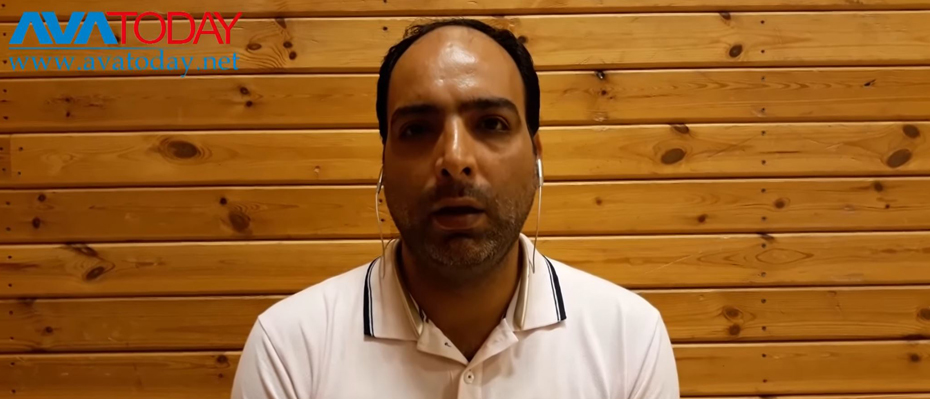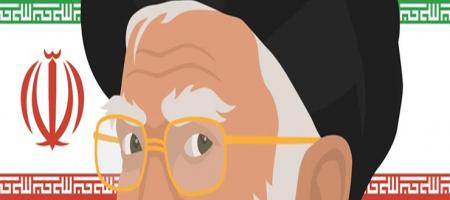
Amirtohid Fazel, a pro-regime journalist and political editor has decided to abandon Iranian Foreign Minister, Mohamad Javad Zarif, and his delegation during a Scandinavian tour last week. He refused to go back to Iran and is now seeking asylum in Sweden.
Fazel, who was accompanying the Foreign Minister’s delegation, worked for Iran’s Movj news agency and had previously worked for Islamic Republic’s official news agency, IRNA.
Avatoday conducted an interview with Fazel on August 21; the day he escaped from the delegation, but as his family were under pressure and due to some other security reasons, the interview was published on August 27.
The following is an interview by Avatoday’s reporter Ali Javanmardi with Fazel on Thursday 22.
Ava Today: Mr. Fazel, tell us a little bit about yourself and your working background.
Fazel: As you already know, I am Amirtohid Fazel, the political editor of Moj News; I’ve been working as a political journalist for almost 20 years, in various news outlets such as Fars News Agency, IRNA, and Hayat, and different newspapers such as Khorshid and Shahrvand. I’ve also worked for state-run IRIB, Young Journalists Club and Radio Dialogue. I was the chief editor of Radio Dialogue for one and half years. My latest position was at Moj News, and as I said I was working as political editor and parliament-government special reporter.
Ava Today: Journalists and reporters, who accompany Iranian senior officials on their visits to foreign countries usually have security watchdogs and guards to prevent them from escaping or abandoning the delegation, like what they have in North Korea, how did you manage to escape?
Fazel: On August 18, we left Iran with Javad Zarif and we had a 6-day mission for visiting four countries, which were Finland, Sweden, Norway, and France. We arrived in Norway on 18th of August, and then we went to Sweden. We stayed in Sweden for two days. In the morning of Wednesday, August 21, I managed to trick the guards of the delegation and leave them, though it was much like an escape. I escaped, and then I introduced myself to the Swedish police and they respectfully guided me to the Swedish Migration Agency, where I applied for asylum.
Ava Today: Well, now that you have applied for asylum, tell us about your family, haven’t they [Iranian security and intelligence forces] coerced your family back in Iran? Haven’t they contacted you or ask you to come back?
Fazel: Unfortunately, my family didn’t have any idea about this; I had reached a point that my presence in Iran would definitely be hard for them too. On Tuesday, August 19, a colleague of mine informed me on an issue--which I will soon disclose—and said several security forces had gone to our news agency to arrest me. In his voice message, my colleague asked me if my wife is home or not, because he knew that I’m not home and told me to tell my wife leave the house. When I was in Tehran, it was formally announced that concerning one of my stories, they wanted to sue me. But, I didn’t think, that they want to arrest me at work. After I heard security forces went to my home while I was with the delegation, I decided to apply for asylum.
Let me talk about my escape a bit more, as I said, in addition to that 48 guards accompanied us, there were also security guards at both ends of the street of the hotel, if we wanted to go out for shopping they were following us. They weren’t part of our official delegation. It was very hard in Finland to find any opportunity to escape. In Sweden with all those demonstrations against Zarif’s visit, it was easier to disappear.
On Wednesday morning, when we had breakfast I understood that Zarif has a speech, and no more program were scheduled for that day. I had also heard that one of the security officers was talking with one of his colleagues saying, “Get all reporters on the bus, take them to the location of Zarif’s speech and then to the embassy, don’t allow them to go out and then take them straight to the airport.” It was the moment when everyone was getting on the bus, I had even handed my luggage over. After that, I asked them to let me smoke a cigarette. They always were complaining me smoke a cigarette, saying, “why you smoke too much?” Or for example at nights they didn’t let us leave our rooms after seven o’clock in the evenings until 9 in the morning. So, at the time of our departure, they let me smoke a cigarette. I went behind the bus and started running, I didn’t even look back. I was very afraid, and when I was running through the alleys, I thought that someone is following me. They kept calling me; I stopped and removed the SIM card, and ran again. Finally, I took a taxi and went to the police station.
At the police station, they treated me very kindly and took me to the Swedish Migration Agency and I applied for asylum there.
Thursday morning, I bought a SIM card and as soon as I connected to the internet and checked my social media accounts and messaging apps, I saw that they had repeatedly texted me, with very friendly words like, “Where are you? Are you lost? We’re worried, here’s the embassy phone number, call the embassy.” Or like, “Dear Fazel, your mother is worried, please call us.”
On Thursday when I finally called my family and told them about my decision, I realized that the same persons who are still talking to me very kindly with words like – “dear Fazel don’t disappoint us, come back, we will say that you were lost, we will support you” – have already threatened my family in Tehran and told my wife ridicules lies about me. I feel they’re not going to leave me and my family alone, but they’re very ignorant. They have to know someone like me who had chosen this path has nothing to lose.
Ava Today: Mr. Fazel, you’ve been the political editor of Moj News, you’ve had 20 years of working experience in state-owned media of Islamic Republic of Iran, tell us about the condition of journalists inside the country. To what extent they have the freedom of expression?
Fazel: Those reporters who accompany Iranian officials in their foreign visits know that they are not free at all. Even, the smallest moves are going to be checked. In foreign trips, there is a team called “Formality Team” accompanying Iranian senior officials, in this trip, 48 people accompanied the Iranian Foreign Minister, Javad Zarif as “formality team” but they were guards, some were Zarif’s bodyguards and other were the guards of journalists and reporters. In Finland, when we cover three or four events including the meeting with the President of Finland we had to be very close to Zarif’s team, but in Sweden it was different. Until arriving in Finland no journalist could leave the group, but in Sweden due to the presence of the protestors against the Islamic Republic of Iran outside the buildings of conferences or hotels, security agents didn’t allow reporters to accompany Zarif. They had told us to visit the city, just a photographer from Foreign Ministry and a cameraman from IRIB accompanied Zarif in the meetings, and we cover the news of the meetings very generally, like “Zarif had a visit.”
Even in Sweden when they’ve told us to go out, we were not alone, we have to go out with the several security guards. There were very strict security measures. There were Iranian security agents all over Stockholm. There were 48 security guards only. Zarif’s private jet was full. I don’t know how they pay for all of these bodyguards and other security forces in Stockholm.
They spent a lot of money on such visits. I guess they paid 400 Euros per night for the room of a journalist and 700 Euros per night for the guards and 1200 Euros per night for Zarif’s assistants, and finally 2000 Euros per night for Zarif’s suit in the Grand Hotel in Stockholm.
Ava Today: Mr. Fazel, in your opinion, do other journalists who accompanied Iranian FM have a similar idea? Are they looking for a way to escape? do they want to separate themselves from Islamic Republic regime?
Fazel: I don’t know what they think; I know some of them who have traveled for years to other countries. I know some of them who support the Islamic Republic; I know some of them are having heavy financial obligations and can’t express their ideas. I don’t really know what they think, but I’ve witnessed myself that when they have arrived in Finland and Sweden and saw people with big smiles on their faces in those countries, they had noticed these smiles and it was a question for them, why people here are so happy and free and why no one is bothering the other. When the consulate officer was talking about laws in Sweden and that for example, children here can enjoy free health care and education, everyone was thrilled. They couldn’t even believe it, asking “How is it possible?” “How the health care of a child is free in Sweden? Is it possible?” and they always were asking the same question: “How about the immigrants, is it free for them too?” and the answer was “yes.”
Back in the embassy, there were also talks about women’s rights in Swede. We were saying that women’s rights are protected here. Female journalists were thrilled. They couldn’t believe it. But as I said, I don’t know if they want to escape or not, I really don’t know. But I know many Iranian journalists, who want to do this and many have already done that in the past, like the case in Lausanne and Vienna, where two journalists managed to escape. I feel if they have the opportunity, most of them think it is a good idea to escape from this regime.
Ava Today: Mr. Fazel, what you would like to tell your colleagues in Moj News, and other state-owned media, colleagues that you have worked with for years. What do you want to say to them?
Fazel: I just want to say that it’s time for action. Journalists have to speak with their conscience and think if 200 dollars for two months really worth it? They can have other professions with much higher income. For how long they want to stay dishonest with themselves? Ebrahim Yazdi (Iranian former politician died in 2017) may rest in peace, once told me a beautiful story, he was saying that I’ve been told, “You are an American agent, you’re a provocateur, you’re an anti-revolutionary, Ok I am anti-revolutionary, I accept all of these charges, but one has to provide livelihood and well-being for people, otherwise no one is holding you back.” I think Islamic Republic officials have eventually to sort out their duties. One asked me why I escaped, and I said one day Zarif will join us, too. If he has enough conscience, one day he will come too.














